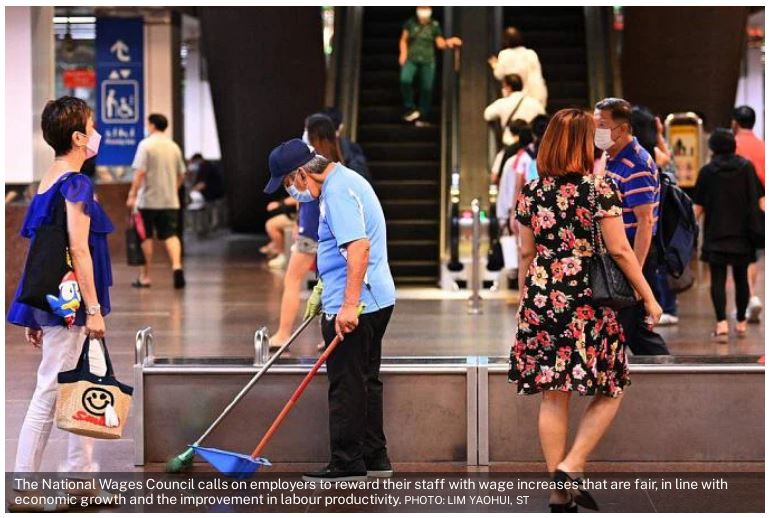Singapore: National Wages Council urges employers to raise pay for lower-wage workers by 5.5-7.5%
EMPLOYERS should give their lower-wage workers a built-in wage increase of 5.5 to 7.5 per cent, or at least S$80 to S$100, whichever is higher, the National Wages Council (NWC) said in its 2022/2023 wage guidelines on Monday (Nov 14).
The lower bounds of this year’s recommendations are slightly higher than that of last year’s, when the NWC recommended a wage increase of 4.5 to 7.5 per cent, or S$70 to S$90.
Mary Liew, president of the National Trade Union Congress (NTUC), said the labour movement had agreed to a lower wage growth recommendation for lower-wage workers last year on the basis that a higher wage growth recommendation could be made this year if the economy has recovered.
“Given that the economy has picked up significantly this year, we all honour the commitment that we made last year,” she told reporters at a joint briefing fronted by representatives from NWC, NTUC, the Singapore National Employers Federation (SNEF) and the Ministry of Manpower (MOM).
NWC’s guidelines said employers that have done well and have good prospects should provide lower-wage workers an increase at the upper end of the wage range, while those facing uncertain prospects should do so at the lower to middle tier of the range.
Employers that have not done well should give their lower-wage workers an increase at the lower limit of the range and raise wages further if business prospects improve, NWC said.
These guidelines apply to employees who are earning a gross monthly wage of up to S$2,200, the threshold of the 20th percentile wage level of the workforce.
During the briefing, panelists acknowledged that it is difficult to establish a quantitative benchmark on which employers have “done well” and which have not, particularly given the uneven recovery that companies are still making from the Covid-19 pandemic.
SNEF president Robert Yap said the distinction will be made at the prerogative of employers, although NTUC’s Liew said employees are “discerning” and would know whether their company is doing well.
Ng Chee Khern, MOM’s permanent secretary, added that one of the key things that makes NWC deliberations “very difficult” is the economic outlook.
“You’re never certain what the outlook is, and therefore if you’re too precise in defining the conditions, it’s not possible. And how much a company pays is not just dependent on past performance but actually future performance as well,” said Ng.
Nevertheless, NWC’s guidelines call for employers to recognise the contributions of employees during the Covid-19 pandemic, when some employees experienced wage cuts and freezes, and supported other cost-cutting measures.
It called on employers to reward their staff with wage increases that are fair, in line with economic growth and the improvement in labour productivity.
Real value-added per actual hour worked rose by 1.5 per cent year on year in the first half of 2022, while gross domestic product (GDP) grew 4.3 per cent in the first three quarters of the year.
At the same time, economic uncertainties underscore the need for resilience and flexibility in wage structures, NWC said, as it urged all employers to implement a flexible wage system (FWS) if they have not already done so.
“As employers, we are concerned that wage growth may outstrip productivity growth, so the FWS allows you to determine how to reward your employees to build in wage increases and variable bonuses to ensure that wage growth is sustainable,” said SNEF’s Dr Yap.
This is also why NWC is recommending employers and workers should press on with business transformation and training, to ensure that wage growth is sustainable and supported by productivity growth.
MOM’s data indicate that wage growth in the last 10 years have matched productivity gains.
However, the proportion of employers that provided structured training fell to 57.1 per cent last year, from 65.4 per cent in 2020, according to NWC.
The proportion of employees receiving such training also inched down to 45.4 per cent in 2021, from 46.5 per cent in the previous year.
“Therefore, the NWC calls on employers and employees to take decisive steps to transform jobs and invest in upskilling and reskilling the workforce, with the support of the Government, trade associations and chambers, and unions,” the council said.
It also urged employees to take a “proactive approach” to ensure the currency of their skills.
NWC chairman Peter Seah said the emphasis on reskilling and upskilling also helps to address the issue of a “destabilising wage-price spiral” that Deputy Prime Minister Lawrence Wong warned of during NWC’s 50th anniversary dinner in September.
“It’s not just to retain and prepare our workers for the changing economy but it’s to improve productivity, arming them with better skills and transforming their ability to contribute,” said Seah.
The labour movement noted that companies have found it difficult to release workers for training with the labour crunch.
But Desmond Choo, assistant secretary-general of NTUC, said one good sign is that companies have been coming on board its company training commitee (CTC) programme.
“We’re trying to drive training at the firm level, making sure they’re sustainable by integrating the ops and tech with a good roadmap, so they get trained through the medium to long term,” he said.
Source: https://www.businesstimes.com.sg/government-economy/national-wages-council-urges-employers-to-raise-pay-for-lower-wage-workers-by-55


 English
English




